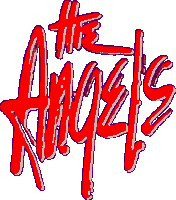

Biography
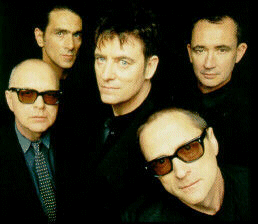
The following is the official biography distributed by the band in October of 1997:
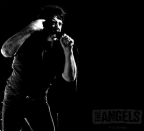
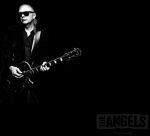
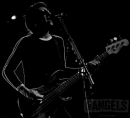
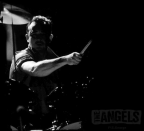
Never.
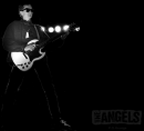
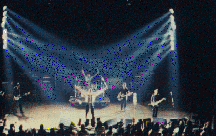
It's Saturday night, and when The Angels are in town, there is nowhere else to be. It's more than devotion, it's more than being a fan. Sometimes it's like a movement, a rally. The Angels can take you to the edge and keep you there.

And that's the way it has been on weekends for teenagers across Australia for more than a decade and a half. When The Angels come to town, it ain't just another gig or a big night out. It's something more, and you will never know what that is until you've been there yourself, right in the thick of it.
Some bands have had strange beginnings. But in Australian hard rock there would probably be none stranger than that of The Angels.
In 1973, vocalist Doc Neeson and guitarist Rick Brewster, and a few friends, walked onto a university stage and picked up their instruments - a washboard, empty liquor jugs, harmonicas, banjos........
The Moonshine Jug And String Band was making its debut gig, playing what Doc Neeson would later call "some god awful 1950s covers".

Flash to 1976 and a fairly new band called The Angels had just finished a highly successful tour with AC/DC. Australian pub rock was, in many ways, still in its infancy, but the ruthless, hard new sound of rhythm laden blues guitars festooning with raw rock n' roll was finding its feet, and powering out of the amps of bands like AC/DC and The Angels.
And few had heard anything like it before. Rose Tattoo were firing around town, scaring some punters shitless with smears of tattoos, and speakers cranked so loud it hurt to stand anywhere closer than the back wall.
One night The Angels were playing a gig in the inner suburbs of Sydney and in the crowd stood Angus Young and Bon Scott with their producers, the hit making team of Vanda and Young. And they liked what they heard.
Pulled straight into the studio, The Angels emerged with a self titled album weeks later, and the first of what would prove to be an unmatchable string of classic Australian pub rock anthems was cut loose on the Australian public. The song was 'Am I Ever Gonna See Your Face Again?'.
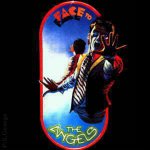 In 1978, The Angels released their second album 'Face To Face' and toured the country. The mix of kick-in-the-gut hard rock, storming guitars, howling vocals and emotionally charged ballads made 'Face To Face' the party album of the year. Songs like 'Marseilles', 'I Ain't The One', 'Be With You' and 'Comin' Down' were heard blasting out of bedroom windows and youth packed cars from the outer suburbs to the inner cities across the nation.
In 1978, The Angels released their second album 'Face To Face' and toured the country. The mix of kick-in-the-gut hard rock, storming guitars, howling vocals and emotionally charged ballads made 'Face To Face' the party album of the year. Songs like 'Marseilles', 'I Ain't The One', 'Be With You' and 'Comin' Down' were heard blasting out of bedroom windows and youth packed cars from the outer suburbs to the inner cities across the nation.
Some could make no sense of this loud hard rock band whose lead singer dressed impeccably in tuxedos and three piece suits, and who sang songs with sometimes intricate lyrics that made references to philosophers, classic literature, holidays in France, drug abuse and occasionally love.
But the teenagers did.
Shows began to sell out soon after they were announced, and the lyrics of The Angels probably did more to expand their audience's vocabulary than most of their school lessons.
In 1979, the 'No Exit' album was released and three more classics were introduced to Angels' fans - 'Mr. Damage', 'Shadow Boxer' and 'Save Me'. The album contained a disturbing piece of Doc Neeson's poetry called 'Dawn Is Breaking'. After much harassment from students, a number of teachers in Australian high schools introduced the piece into poetry classes.
 In 1979 Epic Records signed The Angels to an international recording contract and released a compilation of 'Face To Face' and 'No Exit' called 'Face To Face'. This took The Angels on two extensive American and European tours where they immediately picked a huge fan base in the American Northwest and Canada.
In 1979 Epic Records signed The Angels to an international recording contract and released a compilation of 'Face To Face' and 'No Exit' called 'Face To Face'. This took The Angels on two extensive American and European tours where they immediately picked a huge fan base in the American Northwest and Canada.
The band was renamed Angel City to avoid confusion with glam band Angel. Not long after the release of 'No Exit',
 The Angels unleashed its first collection of greatest hits in Australia. It too rose in the album charts and stayed there for months. It also marked the departure of the band from the Alberts label in Australia.
The Angels unleashed its first collection of greatest hits in Australia. It too rose in the album charts and stayed there for months. It also marked the departure of the band from the Alberts label in Australia.
 The moody, sometimes disturbed and laid back 'Dark Room' album followed in 1980, and gave The Angels its first nationwide number one single in 'No Secrets'. A free live concert on the steps of the Sydney Opera House at the end of that year was marred by violence, and while beer bottles exploded on the stage around him, the mayor of Sydney strode on to announce that no more outdoor concerts would be held in the city. It spelt the end of a decade of free weekend concerts under the hot Australian summer sun, and the boom time of Australian pub rock, The Angels lead the charge.
The moody, sometimes disturbed and laid back 'Dark Room' album followed in 1980, and gave The Angels its first nationwide number one single in 'No Secrets'. A free live concert on the steps of the Sydney Opera House at the end of that year was marred by violence, and while beer bottles exploded on the stage around him, the mayor of Sydney strode on to announce that no more outdoor concerts would be held in the city. It spelt the end of a decade of free weekend concerts under the hot Australian summer sun, and the boom time of Australian pub rock, The Angels lead the charge.
The American tour circuit was then hit with a vengeance. A tour with The Kinks abruptly ended when The Kinks dropped The Angels off the bill for upstaging the main act once too often.
'Dark Room' contained the track 'Face The Day', an Angels classic which was later covered by American rockers Great White in 1988. Later they covered 'Can't Shake It'.
 In 1981, The Angels released 'Night Attack', a blasting, aural blitz of rock and headed to the United States, with new drummer Brent Eccles. The tour highlights included four sellouts at the Roxy In Los Angeles and then a sellout tour from Fresno to Portland in 3-5,000 seat venues. The dates continued through Canada where the band filled even larger halls. The Angels' bassist Chris Bailey missed the first leg of this tour and was temporarily replaced by American Jim Hilbun. A few months later he became a permanent replacement.
In 1981, The Angels released 'Night Attack', a blasting, aural blitz of rock and headed to the United States, with new drummer Brent Eccles. The tour highlights included four sellouts at the Roxy In Los Angeles and then a sellout tour from Fresno to Portland in 3-5,000 seat venues. The dates continued through Canada where the band filled even larger halls. The Angels' bassist Chris Bailey missed the first leg of this tour and was temporarily replaced by American Jim Hilbun. A few months later he became a permanent replacement.
Release and promotional problems with the record company (problems that would arise again and again over the next decade) stagnated the impact of 'Night Attack' in the United States.
Returning home The Angels released the now highly collectible EP 'Never So Live' and went back on tour around the country.
 After a number of months in the studio, The Angels put out an experimental, and sometimes downright weird self produced album called 'Watch The Red' in 1983 (one song saw Doc Neeson ranting about life in a zoo, and then screaming the names of politicians, poets, actors and authors in a continuous stream).
After a number of months in the studio, The Angels put out an experimental, and sometimes downright weird self produced album called 'Watch The Red' in 1983 (one song saw Doc Neeson ranting about life in a zoo, and then screaming the names of politicians, poets, actors and authors in a continuous stream).
Relocating to Los Angeles in mid 1984, with the assurances "that everything would be alright this time", The Angels spent three months shifting from studio to studio, and producer to producer, to eventually complete the 'Two Minute Warning' album now with an international release on MCA.
A rich collection of sometimes politically and socially vicious songs 'Two Minute Warning' told the tale of nuclear annihilation and the events leading up to the last dark days. Once again the downfall of an American record company lead to a poor commercial result, though a tour at the time saw critics praising the live shows and a number of the songs off 'Two Minute Warning' received generous air play across the country. The album has recently been re-released on Metal Blade.
Back in Australia, one of the founding members, guitarist John Brewster departed the band. Bob Spencer joined.
In 1986, The Angels released 'Howling'. Twelve songs that shifted from pop-rock to haunting ballad to all out guitar driven assaults. The album was produced by Englishman Steve Brown and mixed by Bill Price. On the back of the hit singles 'Don't Waste My Time', 'Nature of The Beast' and the remake of the 1960's classic 'We Gotta Get Out Of This Place', 'Howling' soared into the Top 10 nationally. It also saw the band turning their hand to making their own videos, editing together footage shot on camcorders while The Angels were on the road. During the 'Howling' tour, fans in Perth queued outside venues for two days to get tickets, and at one show Doc Neeson shattered a kneecap when he was pulled into the crowd. Refusing to cancel the rest of the tour, Doc Neeson performed for almost two months from a barber's chair placed in the middle of the stage.
The crowds more than made up for his inability to leap around and run riot. The 'Howling' tour took The Angels on a 16 month jaunt around the country, playing to more than 320,000 fans. 'Howling' never saw international release.
 In 1988, what would prove to be the ultimate Angels' fans dream come true was released. 'Liveline' was a double live album recorded mainly during the 'Howling' tour, and the songs spanned almost the entire history of the band. The Angels' most elaborate shows to date were devised to launch the double live album, and the 'Now, Then And Everything In Between' tour played one show in each state of Australia. The epic show ran for more than three hours, in three parts, with three set and clothing changes, and featured not only the hit songs, but rarities as well (some of which had never been played live before) that had the jaws of fans dropping in utter surprise. But the boldest move of The Angels was yet to come.
In 1988, what would prove to be the ultimate Angels' fans dream come true was released. 'Liveline' was a double live album recorded mainly during the 'Howling' tour, and the songs spanned almost the entire history of the band. The Angels' most elaborate shows to date were devised to launch the double live album, and the 'Now, Then And Everything In Between' tour played one show in each state of Australia. The epic show ran for more than three hours, in three parts, with three set and clothing changes, and featured not only the hit songs, but rarities as well (some of which had never been played live before) that had the jaws of fans dropping in utter surprise. But the boldest move of The Angels was yet to come.
"People are going to shit themselves when they hear these new songs", drummer Brent Eccles and guitarist Bob Spencer told their Australian fans, via the media, from Memphis where they were recording the 'Beyond Salvation' album in 1990. And shit themselves they did. When 'Beyond Salvation' was released, it rocketed to number one across the nation, and spawned the top ten hits 'Let The Night Roll On', 'Back Street Pick Up', 'Rhythm Rude Girl' and 'Dogs Are Talking'.
And shit themselves they did. When 'Beyond Salvation' was released, it rocketed to number one across the nation, and spawned the top ten hits 'Let The Night Roll On', 'Back Street Pick Up', 'Rhythm Rude Girl' and 'Dogs Are Talking'.
The recording process did take its toll though with the departures of bassist Jim Hilbun. Three days before they left for Memphis, The Angels auditioned a 21 year old bass player from Perth called James Morley. His previous rock experience had been playing with an Angels cover band in his hometown, and although he could play almost all of The Angels vast back catalogue, during auditions he was asked to play none. Instead a rollicking jam of classic rock songs took place, and James Morley became the newest, and youngest ever Angel.
Like many USA releases for The Angels, the tracks on the American version were different to that released in Australia. In fact on this one only three tracks were in common - 'Dogs Are Talking', 'Let The Night Roll On' and 'Rhythm Rude Girl'. During the recording sessions The Angels played one showcase at the Whiskey in Los Angeles. The show turned into a riot when, from the audience to the stage came three members of Guns 'N Roses, Axl, Duff and Slash who joined the band for an extended encore of immense power. (AC: Angry Anderson of Rose Tattoo also took part in this classic jam!) Chrysalis Records signed the band and things looked in good shape when the first track to American radio 'Dogs Are Talking' picked up solid air play. The air play was not consolidated and 'Beyond Salvation' was unfortunately just that.
In late May 1991, The Angels entered a studio in the suburbs of Sydney to begin work on a new album. Most of the material was composed during extensive slabs of touring that went with 'Beyond Salvation'.
 ( U.S Release )
( U.S Release ) The album, 'Red Back Fever' was released in Australia in November 1991 and attained gold status upon shipping. The Angels and the Drug Offensive then made a special announcement. The Angels would spearhead a 12 month Alcohol Related Violence campaign. A track off 'Red Back Fever', 'Tear Me Apart' became the campaign's theme. The critics lined up but The Angels hit back with a massive 8 week tour that played just about every town in Australia including many all ages shows.
The album, 'Red Back Fever' was released in Australia in November 1991 and attained gold status upon shipping. The Angels and the Drug Offensive then made a special announcement. The Angels would spearhead a 12 month Alcohol Related Violence campaign. A track off 'Red Back Fever', 'Tear Me Apart' became the campaign's theme. The critics lined up but The Angels hit back with a massive 8 week tour that played just about every town in Australia including many all ages shows. In late 1992 and with little fuss both Bob Spencer and James Morley left to pursue solo careers. Doc Neeson, Rick Brewster & Brent Eccles were philosophical. They spent three months working in a small recording studio in Sydney's Mascot. The flame was still burning. On his regular run to the studio Brent Eccles' mobile rang... The Hells Angels - New Zealand wanted the band for a gig. After a quick discussion the trio began a new chapter in The Angels' history. They invited John Brewster and Jim Hilbun back into the band. Even though this lineup had not played together since 1985 the fans came out in droves.
Tour after tour sold out 'Terra Australis Incognita', 'The Barbed Wire Ball' 'The Hard Evidence Tour'. However record company problems seemed to have finally landed on their home ground. The band recorded four new songs 'Don't Need Mercy', 'Turn It On', 'Spinning My Wheels' and 'Blue Light'.
 They were included on the greatest hits package 'Evidence' and 'The Hard Evidence Tour E.P.' Nothing stuck. The band begged to record a new album but Mushroom declined. The band severed the relationship. The Angels recorded and released a new track 'Call That Living' to radio in June 1996. It quickly jumped into the national top ten air play chart. This success spurred the band on. They purchased enough recording equipment to make their own recordings and in the months that followed and under the guidance of guitarist Rick Brewster the band crafted, trimmed, scrapped, rebuilt, pushed and pulled together a shit hot collection of fresh new Angels songs.
They were included on the greatest hits package 'Evidence' and 'The Hard Evidence Tour E.P.' Nothing stuck. The band begged to record a new album but Mushroom declined. The band severed the relationship. The Angels recorded and released a new track 'Call That Living' to radio in June 1996. It quickly jumped into the national top ten air play chart. This success spurred the band on. They purchased enough recording equipment to make their own recordings and in the months that followed and under the guidance of guitarist Rick Brewster the band crafted, trimmed, scrapped, rebuilt, pushed and pulled together a shit hot collection of fresh new Angels songs.
On August 13th 1997 they signed a new recording deal with Shock Records. The fans; The reaction? Well, what do you think?


With thanks to Helen Eccles.

|
This page has been visited
|